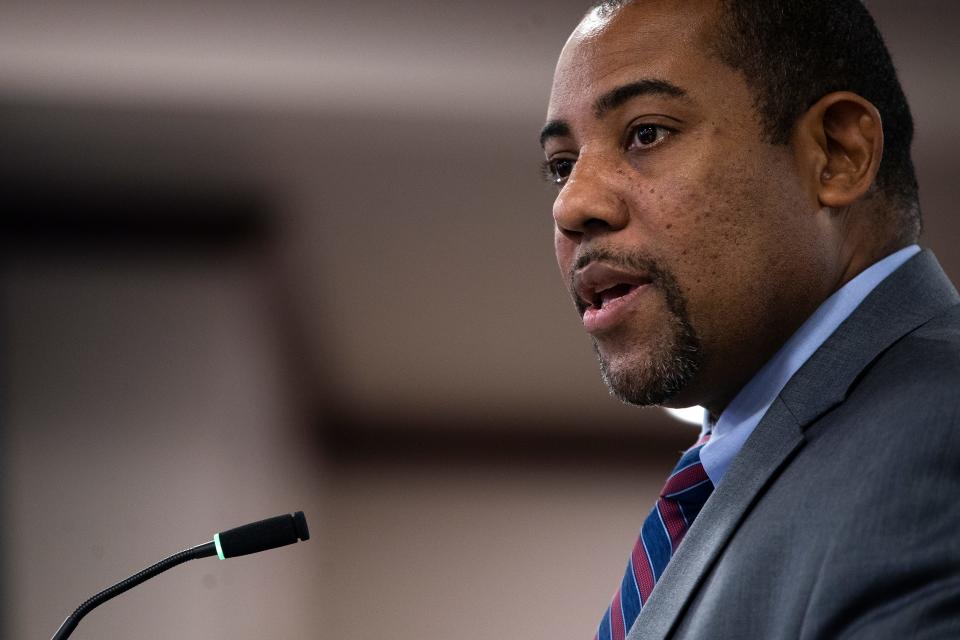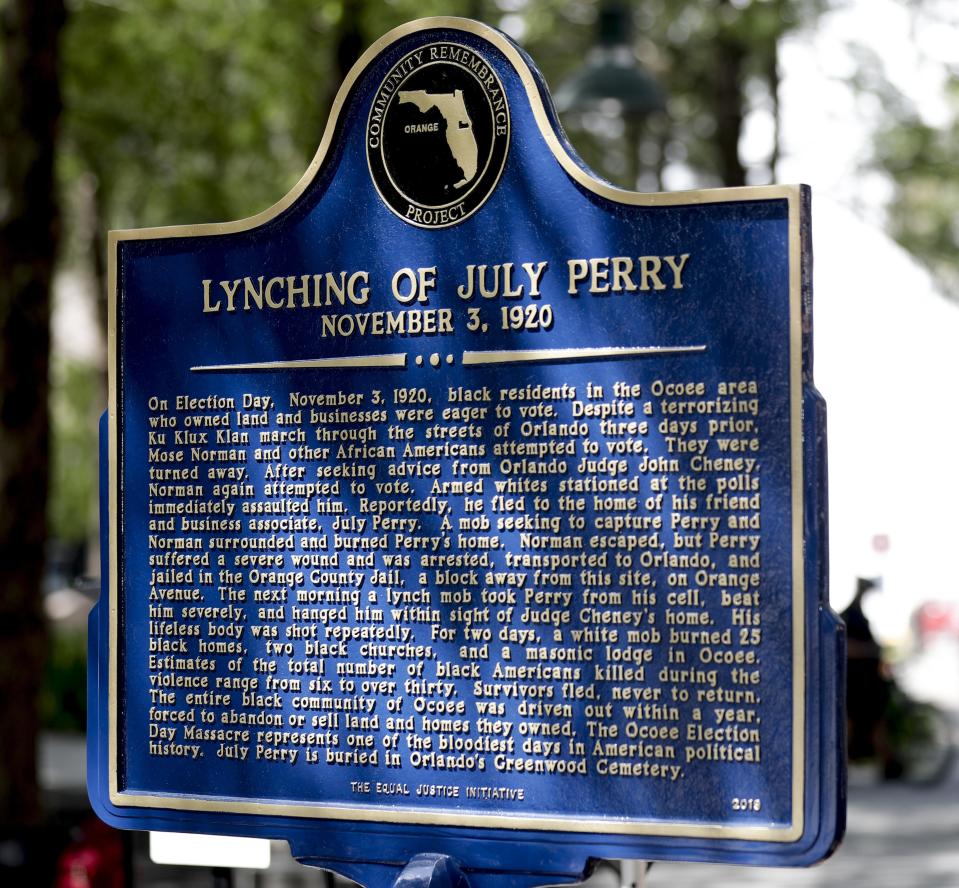DeSantis' state Board of Education approves new rules for teaching African American history
- Oops!Something went wrong.Please try again later.
In a historic move, Florida's state Board of Education has approved new, separate standards for how African American history must be taught to millions of students.
The decision Wednesday comes after Gov. Ron DeSantis and the Florida state Legislature have in recent years passed a host of measures restricting how topics such as race and gender and sexuality can be taught in the state, including at the college level.
Earlier this year, DeSantis and the state Department of Education also took direct aim at the College Board's Advanced Placement course in African American history, banning it from the state. The course is one of the main avenues through which high school students in the U.S. study Black history at an in-depth level.
On Wednesday, after more than an hour of public comment, with a majority of speakers opposed, the Board of Education voted unanimously to approve the social studies standards for African American history for kindergarten through 12th grades.
Opponents say the curriculum leaves out Florida’s role in slavery, the oppression of African Americans, places some blame on Black communities and uses outdated language.
A group of 11 organizations, including the NAACP and the Florida Education Association, criticized the state for omitting or rewriting “key historical facts about the Black experience.”
“We owe the next generation of scholars the opportunity to know the full unvarnished history of this state and country and all who contributed to it – good and bad,” reads a letter to a board member.
At the board’s meeting Wednesday in Orlando, members defended the curriculum and said a factual representation of history was included according to state standards. In 1994, the Legislature passed FS 1003.42, which created the African American History Task Force and requires instruction of history, culture, experiences and contributions of African Americans in the state’s K-12 curriculum.
“Everything is there,” said MaryLynn Magar, who was appointed to the board by Gov. Ron DeSantis this spring. “The darkest parts of our history are addressed, and I’m very proud of the task force. I can confidently say that the DOE and the task force believe that African American history is American history, and that’s represented in those standards.”
But Genesis Robinson, political director for advocacy group Equal Ground, said the curriculum only identifies and recognizes racism and prejudice and does not go into depth what groups in power promoted violence against and disenfranchisement of Black people in the United States.
“When you couple these standards, with the environment, the hostility toward daring to talk about certain subjects, it creates an environment where there's going to be a complete removal of these conversations and of these lessons in the classroom because nobody wants to run afoul of all of the laws or policies that have been put in place,” Robinson said.

Ongoing battle with DeSantis' education agenda
The battle over social studies standards is the latest in a struggle between the DeSantis administration and Florida’s African American communities and educators, who say his educational agenda targets Black, brown and LGBTQ Floridians.
Last year, DeSantis, who is running for the Republican presidential nomination, signed the Stop WOKE Act, which restricts how race is discussed in schools, colleges and workplaces and prohibits any teaching that could make students feel they bear personal responsibility for historic wrongs because of their race, color, sex or national origin.
And this spring, the state Education Department rejected the College Board’s Advanced Placement African American Studies class, saying it violated state law because of topics like Black Lives Matter, Black feminism and reparations.
The AP class has still not been approved to be taught in Florida.
This is the first year the state has created separate standards to teach African American history, said Paul Burns, chancellor of public schools for Florida's Department of Education.
Critics says curriculum lesson is 'blaming the victim'
Opponents pointed out several issues in the curriculum: Elementary and middle school students are not required to learn about African American history past Reconstruction; the middle school curriculum includes a clarification that states “Instruction includes how slaves developed skills which, in some instances, could be applied for their personal benefit”; and in high school, when learning about the Ocoee Massacre, the curriculum states “Instruction includes acts of violence perpetrated against and by African Americans.”

“When you look at the history currently, it suggests that the (Ocoee) massacre was sparked by violence from African Americans. That's blaming the victim,” said state Sen. Geraldine Thompson, who is listed as an emerita board member on the task force’s website.
The Ocoee Massacre is considered the largest incidence of Election Day violence in U.S. history, according to the Orange County Regional History Center. In 1920, Mose Norman, a Black man, tried to vote but was turned away from the polls. Later that night, a white mob tried to find Norman at his friend’s house. His friend July Perry was lynched, and other Black community members were murdered and their houses burned. Most of the Black community fled Ocoee and never came back.
The curriculum also does not mention that Florida seceded from the Union during the Civil War, Robinson said.
“The standards are so porous because they're incomplete,” he said.
At the beginning of public comment, task force chairman Glen Gilzean defended the work group's efforts and reiterated DeSantis' stance he took in February when the governor was accused of "whitewashing" African American History by requiring changes to the AP African American Studies course.
"Black history is American history, and we've heard that repeated time and time again this morning," said Gilzean, who has been appointed to numerous boards and commissions by DeSantis, including his latest position on the Florida Commission of Ethics.
"Let's be clear: Florida already requires the teaching of African American history," Gilzean said. "But the new standards align these requirements and will hold teachers accountable to ensure that complete and accurate African American history continues to be taught."
This article originally appeared on Tallahassee Democrat: DeSantis' Board of Education in Florida approves Black history classes

